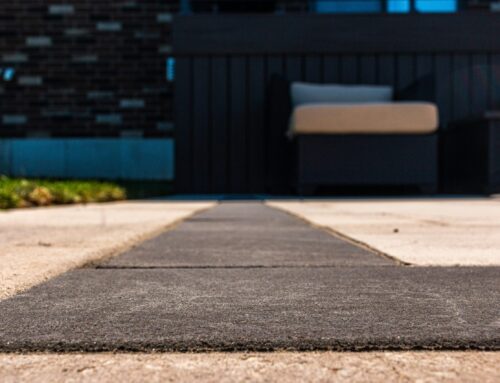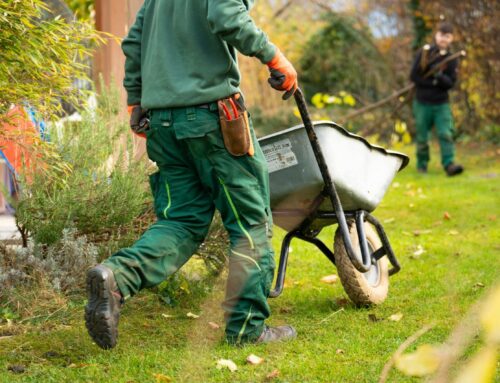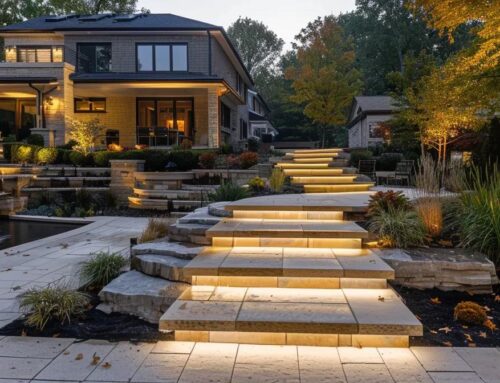Innovative garden features can completely redefine small outdoor spaces by integrating modern landscaping ideas that prioritize function and style. Vertical designs, container gardening, and compact plant varieties—when combined with refined Bret-Mar landscape techniques—maximize space without sacrificing visual impact. Multi-purpose elements and clever storage solutions remain central to effective landscaping services, while strategic layouts take cues from contemporary landscape architecture to create flow and cohesion. With the right design choices, even the smallest yard can become a vibrant and efficient outdoor retreat.
Implementing Vertical Designs for Space Efficient Gardens
Building Wall-Mounted Planters for Greenery
Wall-mounted planters free up floor space while offering a stylish way to display greenery. They promote healthy plant growth, are easy to maintain, and create striking vertical gardens ideal for urban yards and balconies.
Choosing Trellises and Arbors to Support Climbing Plants
Trellises and arbors provide sturdy support for climbing plants. They create natural screens, improve sunlight distribution, and add a decorative accent, making them perfect for enhancing overall garden productivity.
Creating Tiered Planting Beds for Varied Heights
Tiered planting beds offer multiple levels for plant display. This design improves drainage and visually expands a small area without sacrificing functionality. Every inch is optimized while maintaining balanced aesthetics.
Using Hanging Baskets to Add Aerial Green Elements
Hanging baskets introduce greenery above ground level. They integrate flowers and herbs seamlessly, freeing up space and adding visual interest while extending planting opportunities in compact settings.
Constructing Living Walls as Striking Space Efficient Garden Features
Living walls merge artful design with vertical gardening. By incorporating diverse species, they create dynamic ecosystems that improve air quality and provide sustainable natural beauty in tight spaces.
Utilizing Containers for Flexible Small Space Gardening

Selecting Appropriate Pots and Planters for Limited Areas
Choosing the right pots maximizes space and supports healthy root development. Compact, lightweight planters with optimized dimensions improve water retention and enhance the overall layout for container gardens.
Arranging Container Groupings for Visual Appeal
Grouping containers in strategic clusters creates focal points and boosts visual rhythm. A well-arranged display of varied textures and sizes results in a harmonious layout that elevates garden appeal.
Growing Vegetables and Herbs in Compact Containers
Compact containers offer controlled environments ideal for vegetables and herbs. They simplify maintenance and harvesting while ensuring continuous seasonal production, making them perfect for kitchen gardens.
Moving Containers to Optimize Sunlight Exposure
Relocating containers allows each plant to receive proper sunlight. This adaptable method adjusts to seasonal changes and balances shade with direct exposure, ensuring optimal growth in small spaces.
Incorporating Self-Watering Containers for Easy Maintenance
Self-watering containers deliver consistent moisture and reduce maintenance needs. They prevent overwatering and drought stress while improving overall plant health, ideal for busy gardeners.
Selecting Compact Plants for Efficient Garden Layouts
Choosing Dwarf Varieties of Trees and Shrubs
Dwarf trees and shrubs provide structure without overwhelming limited spaces. They maintain beauty and resilience while limiting growth, making them perfect for urban yards and container gardens.
Planting Slow-Growing Species to Manage Size
Slow-growing species help keep landscapes tidy by limiting expansion. Their measured growth reduces pruning effort and supports long-term order, ensuring a harmonious balance in small-scale designs.
Utilizing Groundcover Plants in Tight Spots
Groundcovers spread evenly, reducing weed growth and providing soil protection. Their dense mats help reinforce borders and offer low-maintenance, efficient solutions for small garden areas.
Selecting Plants With Narrow Growth Habits
Plants with narrow growth habits optimize space by growing upward rather than sprawling. This selection enhances design efficiency and creates clear, uninterrupted pathways in compact settings.
Integrating Edible Plants Into Ornamental Small Space Designs
Edible plants combine functionality with ornamental appeal. Integrating kitchen garden herbs or vegetables not only adds flavor but also makes the space more productive and visually engaging.
Designing Multi-Purpose Elements in Compact Gardens

Building Benches With Integrated Storage Compartments
Benches that incorporate storage serve dual purposes by offering seating and hiding tools. This design minimizes clutter while maintaining a stylish look, blending utility with elegance.
Incorporating Fold-Down Tables for Outdoor Dining
Fold-down tables convert easily between dining surfaces and storage units. Their compact design optimizes space during gatherings, making them ideal for multifunctional outdoor use.
Using Planters That Double as Privacy Screens
Dual-purpose planters function both as vibrant greenery displays and privacy screens. Their design enhances safety and aesthetic appeal while maximizing overall space efficiency.
Creating Raised Garden Beds With Seating Edges
Raised garden beds that incorporate seating edges merge horticulture and relaxation. They offer improved growing conditions and additional seating, creating a modern, space-conscious outdoor design.
Designing Water Features That Fit Small Footprints
Compact water features add soothing elements without taking up much space. These small installations improve microclimates and introduce dynamic interest, enriching the sensory experience.
Clever Storage Solutions for Tidy Small Garden Areas
Installing Slim Sheds or Storage Boxes
Slim sheds and storage boxes keep garden tools neatly hidden while maximizing vertical space. They protect supplies and contribute to an organized, clutter-free outdoor area.
Using Wall-Mounted Organizers for Tools
Wall-mounted organizers free up floor space and speed up tool retrieval. Their efficient design ensures essential items are always accessible while maintaining overall aesthetics.
Repurposing Furniture for Garden Storage Needs
Repurposed furniture can transform into stylish storage units with hidden compartments. This creative solution adds vintage charm while being eco-friendly and practical for garden storage.
Hiding Hose Reels and Utility Items Creatively
Cleverly disguising hose reels within planters or storage benches reduces visual clutter. This integration keeps utility items accessible without sacrificing design integrity.
Building Under-Deck or Under-Stair Storage
Under-deck and under-stair storage solutions utilize unused spaces for tools and supplies. Concealed compartments maximize every inch, ensuring a clean and organized garden.
Strategic Layout Techniques to Amplify Small Garden Perceptions

Creating Zones Within a Small Garden Space
Dividing a garden into distinct zones clarifies function and movement. Well-defined zones with pathways and plant borders create organized areas for relaxation, play, and cultivation.
Using Mirrors to Create an Illusion of More Area
Mirrors reflect light and greenery to visually expand small spaces. Their strategic placement boosts depth perception and makes even the tiniest garden appear larger.
Designing Pathways to Guide the Eye and Movement
Clearly defined pathways structure a garden by guiding the eye and organizing movement. Thoughtful walkways enhance space perception while promoting efficient traffic flow.
Employing Light-Colored Materials to Brighten the Space
Light-colored surfaces reflect natural light and mitigate shade in confined areas. These materials help brighten the overall design, creating a lively and welcoming ambiance.
Layering Plants to Add Depth and Dimension
Layering plants in staggered heights creates visual depth and contrasts in texture. This tiered arrangement enriches garden aesthetics and maximizes every available planting area.
Table: Compact Garden Features Comparison
| Feature | Benefit | Ideal For | Space Requirement |
|---|---|---|---|
| Wall-mounted planters | Frees floor space | Urban balconies | Minimal |
| Self-watering containers | Easy maintenance | Container gardens | Compact |
| Under-stair storage | Maximizes unused areas | Small backyards | Negligible |
This table summarizes key features, benefits, and space requirements. It helps you choose solutions that suit your garden’s constraints and design goals.
Final Thoughts
Maximizing small spaces calls for innovative design and clever integration. Each feature contributes both efficiency and visual appeal, creating functional and beautiful gardens. Apply these strategies to transform your limited area into a productive and inviting outdoor space.
Frequently Asked Questions
Q: How can vertical designs boost garden productivity?
A: Vertical designs free up floor space, enhance aesthetics, and support healthy plant growth with efficient sunlight and water distribution.
Q: What are the benefits of self-watering containers?
A: They provide constant moisture, reduce maintenance, and promote steady growth by preventing water stress.
Q: How do multi-purpose elements improve small garden layouts?
A: Multi-purpose elements like benches with storage or fold-down tables combine functionality and style to reduce clutter while maximizing space.
Q: Can compact plants truly thrive in limited areas?
A: Yes, dwarf varieties and slow-growing species are bred to perform well in constrained spaces while maintaining beauty and resilience.
Q: What storage solutions work best in tiny outdoor spaces?
A: Under-deck storage and wall-mounted organizers effectively hide clutter, maintain organization, and enhance a garden’s overall aesthetics.




